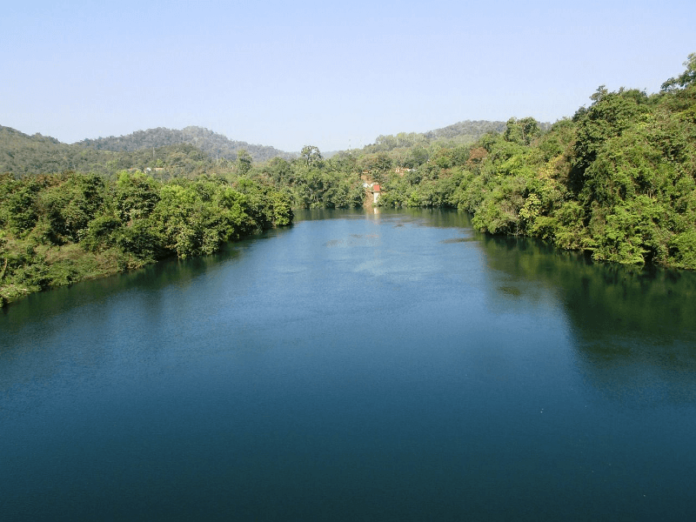Swachch Bharath is not merely about building toilets. We need to keep our rivers and water bodies clean if we have to avoid an ecological disaster.
By Krishnasakhi
The nation is waiting for the best in everything that the government can provide to its citizens. These include-clean roads, streets, houses, toilets, better rural roads, water, and hygienic food. Consequently, PM Narendra Modi’s Swachch Bharath scheme found resonance with the public at large. However, cleaning the nation is not just a political initiative; it should be a mass movement supported by every citizen.
Cleanliness is not merely about keeping things clean within our homes, but its also about keeping our environment clean. Availability of clean drinking water and clean food is also as important as keeping our homes clean. The land in India is fertile and we can grow diverse crops including cotton, sugar, rice, wheat, apple, orange, sunflower and so on and so forth. All these corps can be grown only if the required quantity of water is available in the ground.

Many states in India are blessed with rivers, which are potentially capable of providing clean drinking water to the people. Krishna, Godavari, Narmada, Cauvery, Ganga, Yamuna, Brahmaputra, Tapti, Indus, Sutlej among others cater to the needs of agriculture as well as consumption.
These rivers around the nation provide more water to us than we can possibly use. But as people or society have not bothered to preserve and keep these rivers clean. Over the years, we have kept on polluting the rivers by dumping all kinds of garbage and unwanted things into the rivers and even oil from the boats and barges which lead to water pollution and suffocate for the marine life. Here I take the example of Yamuna, as it is the most polluted among the rivers in India.
The Yamuna is among the top 50 polluted rivers in the world. In places this river passes through, 58 per cent of the waste is dumped into this river. New Delhi generates 1900million litres of sewage every day and most of it ends up in Yamuna river. Increase in population is only adding to the pollution of air, streets and water bodies.
The Yamuna River washed Krishna’s lotus feet when the Lord appeared in Vrindavana thousands of years ago. But now we can’t even wash our own feet or face with that water as it is terribly polluted.
In Hindu tradition, a river is treated as divine. Indians worship the rivers in almost every festival {Ganga pooja}. While such rituals are part of our culture we don’t care about ensuring our rivers remain clean and unpolluted.
The State Karnataka is blessed with many rivers like Krishna, Kaveri, Arkavathi, Tunga, Bhadra, Sharavathi, Kali, Bhima and Netravathi among others.
Karnataka is the main source of water resources in southern India. The rivers in Karnataka flow through other states in south India.
We are lucky to be blessed with so many rivers, but we are incurring the wrath of nature as we are contaminating them.
Here are a few things we do knowingly or unwittingly.
- You go to the river and take a bath in it to wash off all your sins, but you have only passed on your dirt to the water. You’d also have passed on the chemicals in your soaps and shampoos to the river, further polluting it. Is that really our tradition? Ask yourselves.
- You go to the riverside as a tourist. You enjoy every moment in that river. Then you consume alcohol right there and throw the glass and the plastic water bottles into the river.
- Companies dump their industrial waste into the river.
- Direct plastic waste.
- Fish waste.
- Unwanted meat waste is thrown into the river.
- Sewage water enters the river.
- Quality of water goes B grade in monsoon and C grade during summer {A grade water is directly consumable, B grade water can be consumed after purification according to Central Pollution Control Board (CPCB)}
These are only a few issues we can highlight regarding the havoc we have unleashed on our water resources. Governments take many steps to clean the river, but what is the use of those when common folk in the country are not aware of the damage they are causing to the rivers and don’t do anything about it?
The way we treat and maintain our water resources will decide whether we develop as a nation or deteriorate. People who live around rivers will have to complement government schemes and regulation by pitching in to keep the rivers clean.
To start with they can regulate the tourists.
- They should be educated on the dos and don’ts around water bodies.
- They should be provided appropriate places for disposal of the wastage.
- No liquor should be sold near river bodies.
- Security checks should be made compulsory for people travelling.
- Security guards should be in charge of enforcing the rules and monitoring the behaviour of the visitors.
- Tourists should not be allowed to use soaps, shampoo etc. in the river.
- People should not be encouraged to eat any packed food in and around the river.
- Plastics should be totally banned on the river bank.
- No clothes should be thrown into the water
Ideally, these recommendations should be made mandatory across the nation as most of the garbage going into our rivers are nonbiodegradable.
Plastics take more than 1000years to decompose. Plastic water bottles take 450years to decompose.
A polyester cloth, which is thrown in the water, takes 20years at its best or 200 years at the worst to decompose.
Whereas, glass bottles take a million years to decompose in the water.
Whereas the fruits and vegetables are decomposed very fast due to the bacteria present certainfoods require water and oxygen to decompose.
It’s high time we stopped polluting our rivers and provided access to clean water to everyone. Rivers form an important part of our ecology and environment. Our inability to keep them clean and unpolluted can only lead to disaster.








